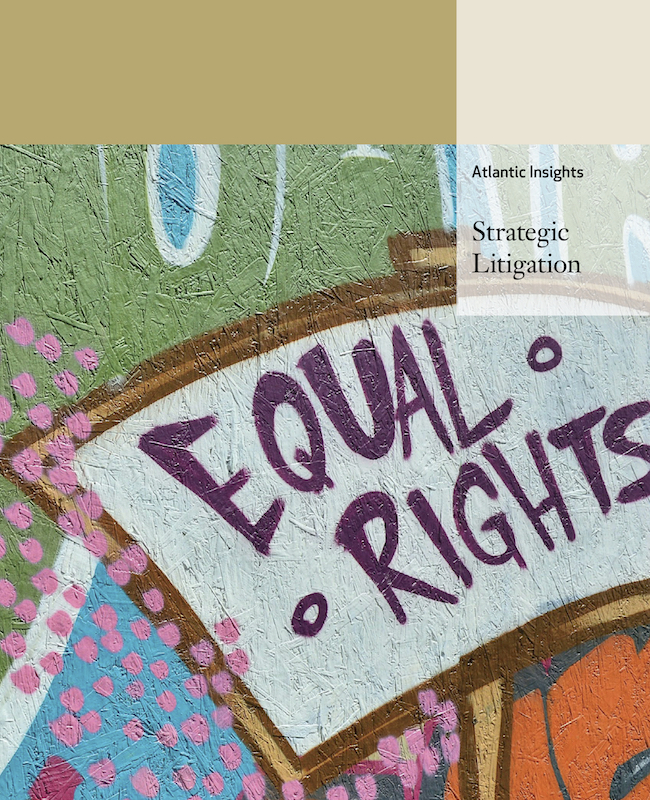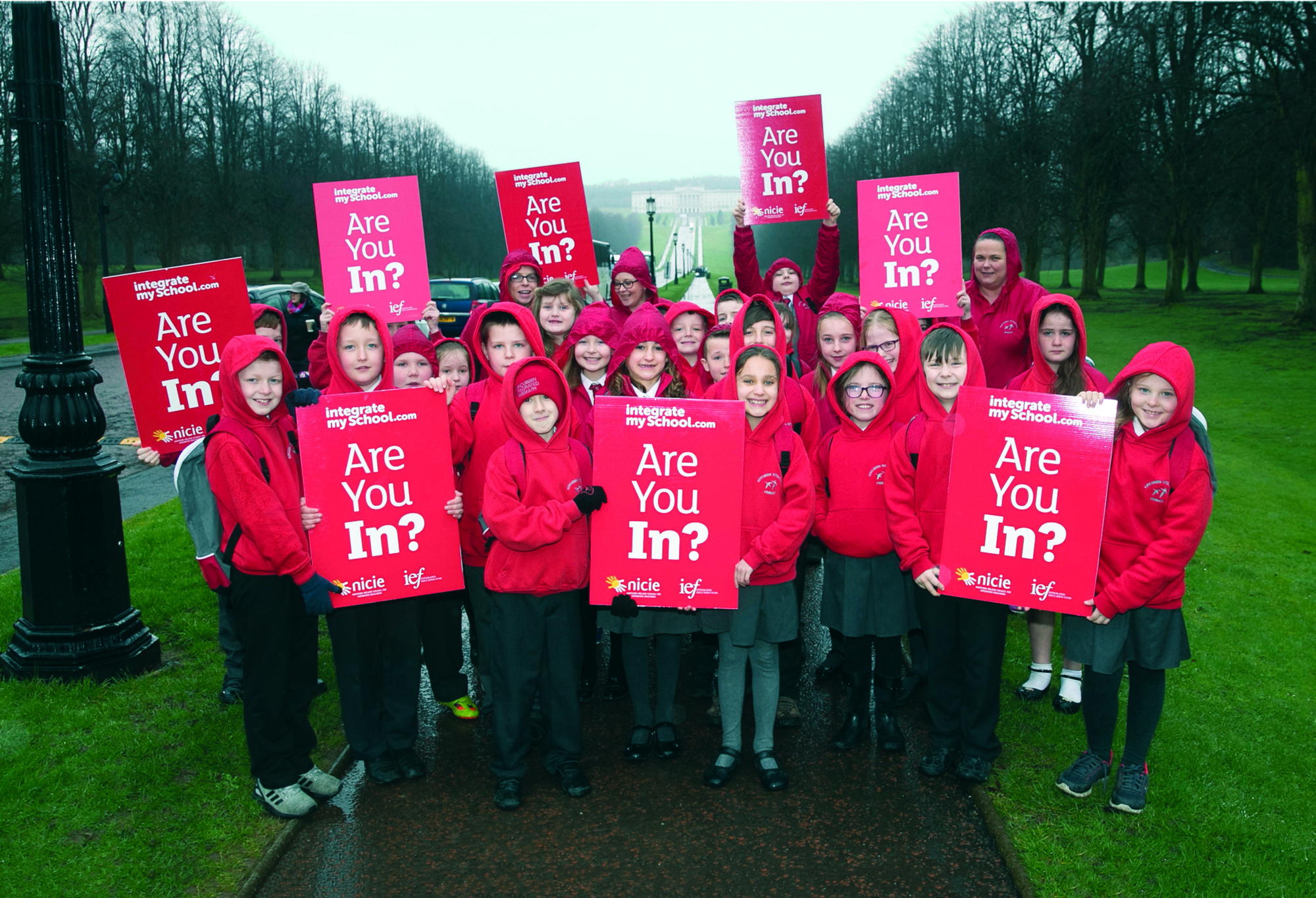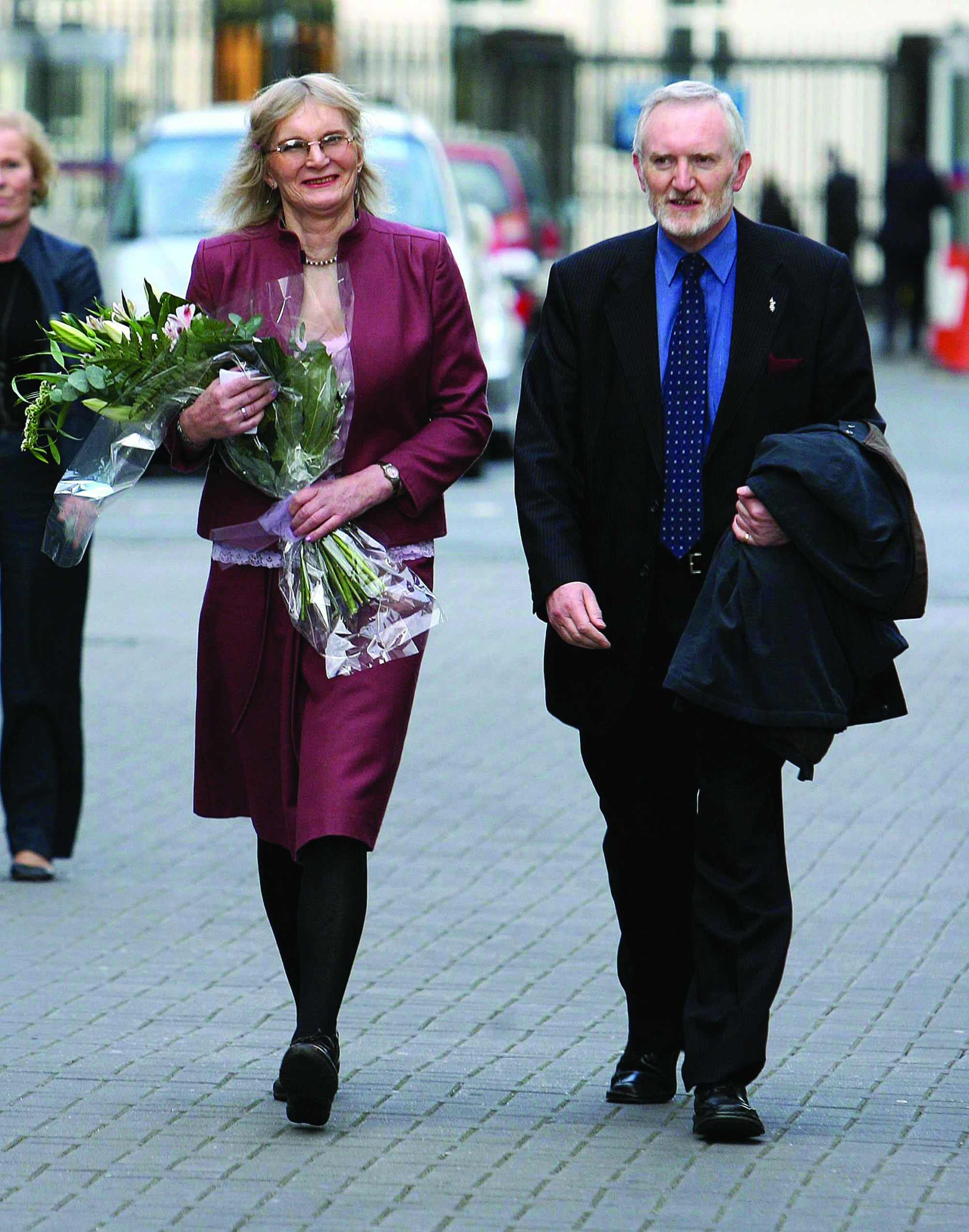Atlantic Insights Strategic Litigation
About the Book
Litigating for social change.
This book showcases how Atlantic grantees around the world used strategic litigation to advance human rights and equality both in the courts of law and public opinion. It offers six case studies on lawsuits to:
- Expand integrated schools in Northern Ireland
- Deliver on anti-poverty reforms in Northern Ireland
- Secure rights for transgender people in Ireland
- Deliver on the promise of equal education in South Africa
- Reform discriminatory policing practices in New York City
- Provide U.S. Medicare coverage for skilled nursing and therapy to maintain a patient’s condition, regardless of the nature of illness, disability or injury

Introduction
Over the years, The Atlantic Philanthropies has seen that strategic litigation can be a powerful tool for promoting social change. With assistance from Atlantic, advocacy groups in Northern Ireland, the Republic of Ireland, South Africa, and the United States have mounted legal challenges to address a broad range of problems, from race discrimination to poverty and socio-economic inequality to violations of civil liberties and basic human rights.
That litigation has, among other things, helped reduce racially biased policing practices in New York City, expanded the rights of transgender people in the Republic of Ireland, and compelled the South African government to begin living up to its promise to provide a basic education to all school-age children, no matter their economic circumstances.
Indeed, those sorts of successes clearly show that governments can be held to account — and that a sound, well-executed legal strategy can not only help improve the lives of disadvantaged or marginalized individuals, but lead to lasting systemic social and economic improvements.
Litigation often requires a major investment of resources, and can be a long, time-consuming undertaking. But, as Atlantic has learned, it can also produce significant payoffs, especially when litigation is combined with other advocacy efforts.
If a foundation is interested in making large-scale social changes, litigation can be very effective.
The case studies contained in Atlantic Insights: Strategic Litigation seek to highlight the various ways Atlantic grantees have used strategic litigation to help advance social and economic justice.
They include two landmark suits that took place in Northern Ireland (NI). The first, a major victory for the movement to promote integrated education, clearly established that the Northern Ireland government has a statutory duty to encourage and facilitate efforts to boost the number of schools serving children of all faiths and backgrounds.
In the second NI case, anti-poverty activists challenged the government’s failure to adopt and implement a strategy to alleviate poverty, as required under the 1998 Good Friday accords and the St. Andrews Agreement of 2006. In a major win for plaintiffs, the court ultimately found that government has a legal duty to put forth clear policies to tackle poverty and patterns of social exclusion and deprivation in Northern Ireland.
The case from the Republic of Ireland involves transgender rights. Originally filed in 1993, the litigation successfully challenged the government’s refusal to allow transgender people to change their birth certificates to reflect their new identities. The lengthy battle finally came to a close in 2015 with the passage of Ireland’s new Gender Recognition Act.
Another case study covers two lawsuits brought by lawyers at the Johannesburg-based Legal Resources Centre to address appalling infrastructure problems at many South African schools. Given that the South African constitution guarantees children the right to a basic education, both suits argued that the government’s failure to provide safe habitable school buildings and classrooms violated the rights of students. In a clear victory for plaintiffs, the government ultimately agreed to launch a major school rebuilding and repair campaign, which is currently underway.
This Insights also features two cases in the United States. The first was a pivotal class action brought by the Center for Constitutional Rights (CCR) to stop racial profiling in New York. CCR lawyers argued that the city’s stop and frisk policy violated the rights of black and Latino citizens, and ultimately won a landmark victory ordering sweeping police reforms.
In another U.S. class action, lawyers at the Center for Medicare Advocacy successfully challenged a Medicare rule that required patients to show “continuous improvement” in order to remain eligible for Medicare coverage for rehabilitative services. The result: a federal court found that Medicare could no longer routinely deny claims for so-called maintenance therapy, and more seniors should be able to get the physical and occupational therapy they need.
With these case studies, Atlantic seeks to share what it has learned to inform others in philanthropy about the potential of strategic litigation to bring about social change, and help interested funders and non-governmental organizations use it to greater effect.
Making the Case
“If you can change the law, then you change the way the whole system operates.”

Martin O’Brien, former senior vice president for programs for The Atlantic Philanthropies, oversaw much of the foundation’s grantmaking in support of strategic litigation around the world. O’Brien, who now serves as director of the Social Change Initiative, a Belfast, Northern Ireland-based nonprofit that works to improve the effectiveness of activism for progressive social change, discusses in this interview, excerpted from Atlantic Insights: Strategic Litigation, why supporting strategic litigation is an effective grantmaking strategy.
Why should foundations consider supporting strategic litigation?
If you’re a funder looking to bring about large-scale systemic social change, strategic litigation can be a very important tool. The law shapes and influences public policy and practice. It influences people’s behavior… it influences the way in which money gets spent. If you can change the law, then you change the way the whole system operates. That can mean major impact. What donors invest in strategic litigation can yield a big result and offer a very good return.
What do you consider a successful outcome in a strategic case?
I think the real test of a successful outcome is whether it makes a change to the lived circumstances of people at a particular time and place.
How can funders help ensure that a strategic suit will succeed?
Obviously, funders want to have the very best legal minds working on the litigation, and a sharp, effective legal team. They also need to ensure that that legal team works closely with the people who are most affected by the case.
One of the key lessons we’ve learned is that legal actions are most likely to succeed when they’re intimately linked to and informed by the needs and concerns of the people who have a stake in the outcome. There needs to be a very close alliance between lawyers and clients.
It’s also very important that the litigation be tied into a wider effort to press for reforms and social change. A case in and of itself that’s not connected to a broader advocacy campaign is unlikely to succeed in a significant way.
Which types of ancillary advocacy activities have been the most effective?
That depends on the issue, place, and time. Sometimes the complementary work needs to be public-policy-oriented, to get bills or amended laws moving through the legislatures. Sometimes it’s about a communication strategy, about how you get this issue into the public domain, how you get it being talked about on radio, how you get the issue into the public narrative. Sometimes it requires significant mobilization of public opinion and of people on the ground. Those are other kinds of strategies that often complement strategic litigation. In our experience, they’re often needed to push the issue to the point where you actually get the result you want, which is change on the ground for the people who need it.
Are there certain types of problems or issues that are best addressed by strategic litigation?
Part of what you have to establish is that there is some legal issue, there is some legal right that needs to be litigated, and that there is some precedent that is on your side. In South Africa, strategic litigation became important on particular issues because there was a strong bill of rights. That bill of rights created opportunities for litigation to make progress across a range of issues.
That said, I think it’s a good rule to view litigation as a last resort, not as a first resort. I think people’s cases are often strengthened by the fact that they can say, “Well, we tried. We met with the government on 15 occasions. The government made all of these promises to us. They failed to deliver on any of them and now, reluctantly, we are going to court.”
Is the cost of supporting strategic litigation costlier than other types of advocacy work?
I think it’s a bit of a myth that strategic litigation is always expensive and always takes a long time. I actually think that if you look closely at this relative to other ways in which foundations invest their funds, investing in strategic litigation can often provide you with good value. Obviously some kinds of cases can be costly and take a great deal of time and effort, but other pieces of litigation can be of a relatively short duration and relatively inexpensive given the return on investment. I think almost invariably the yield is disproportionate to the investment in terms of numbers of people affected and scale of change that it can deliver in terms of influencing the system and how policy is applied, how law is interpreted. Trying to secure those changes through other types of advocacy work may end up taking you a lot longer and may end up costing you a lot more money.
What are the main risks for funders who support strategic litigation?
Obviously, a big concern for philanthropy is to do no harm. When you litigate, there is a risk that the outcome may make things worse for people and that you may set things back by backing the wrong case, by not being strategic enough. A donor needs to ask what can go wrong, and what’s the likely fallout if it does. That is something that I think every donor should ask about every investment they make.
Strategies for Success
It Takes More than Litigation to Succeed
Litigation alone is rarely sufficient to achieve social change. These three strategies should also be used:
- Public information: Public information campaigns that inform ordinary people of their rights are an essential component of any effort to achieve social change on rights issues.
- Advice and assistance: It is essential that there are intermediary organizations that enable people to claim their rights, by giving advice, directing them to the appropriate institutions, assisting them with the formulation of their claims, and taking matters up on their behalf — all of which can be done successfully without necessarily engaging in litigation.
- Social mobilization and advocacy: Rights have to be asserted both from outside and inside the courts. Some form of social movement is necessary to identify issues, mobilize support around them, make use of political pressure, engage in litigation where necessary, and monitor and enforce favorable laws and orders by the courts.

Critical Factors
Organize, Coordinate and Think Long-Term
These three elements are key to successful litigation for social change:
- Proper organization of clients: Litigation is likely to achieve greater social change when the client is an organization with a direct interest in the matters being litigated. Moreover, litigation is likely to achieve greater social change when the client plays an active and engaged role — rather than allowing legal representatives to make key decisions without proper client input.
- Overall long-term strategy: Rarely does litigation achieve maximum social impact by virtue of a single case. Rather, it tends to require a series of cases brought on different but related issues over a substantial period of time. This makes it critical that organizations pursuing litigation to achieve social impact do not attempt to rely on a “one-shot” success. Instead they must develop a coherent long-term strategy that allows them to benefit from the substantial advantage of being a repeat player in the courts.
- Coordination and information sharing: In virtually any given area of litigation, there are multiple organizations with similar aims all seeking to achieve success via litigation. Failure to coordinate and share among organizations creates a danger that resources will not be used effectively and, even more damaging, viable cases will be undermined by other conflicting cases being brought by other organizations simultaneously or beforehand. As a result, successful litigation requires organizations to coordinate and share information with all the groups involved so that they can build on each other’s success.
Key Lessons
Top Takeaways
- Strategic litigation can be used both to hold government account and as a powerful tool in helping achieve social change.
- Winning a settlement with government is only the first step. Implementing, improving it and adjusting it are essential.
- In strategic litigation cases, funders can play an important role supporting coalition-building. And after bringing grassroots groups together, it’s also important that funders get out of the way and let them take the lead.
- Even when public-interest litigation doesn’t produce immediate results, it can still pay off big by drawing attention to problems and helping mobilize public support for reform.
- Litigation should only be pursued when the timing is right and all other means to resolve the issue have been exhausted. Pursuing litigation prematurely could result in an unsuccessful outcome and foreclose opportunities to bring a lawsuit again.

Download
Read it now.
Support for strategic litigation can help lead to large-scale, lasting social impact.
Download the full book (PDF) ›
Further Reading
